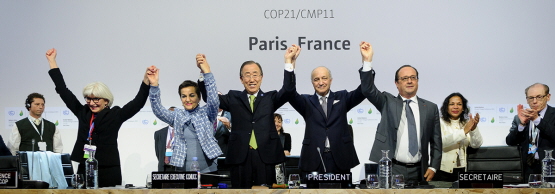
The Paris Agreement is a global climate agreement designed to limit global warming and support those affected by climate change.

Photo: UN Photo/Mark Garten
The Paris Agreement was adopted in December 2015. However, negotiations regarding the Paris Agreement rulebook were first completed in November 2021 when the Parties reached an agreement at COP26 in Glasgow. Almost all countries in the world have ratified the Paris Agreement, agreeing to regularly report their emissions and what they are doing to reduce them.
Under the Kyoto Protocol, only industrialised countries had legally binding mitigation targets, whereas under the Paris Agreement, all countries have a shared responsibility to combat global climate change. These targets are communicated by countries in their Nationally Determined Contributions (NDCs). The long-term target of the Paris agreement – to limit global warming to well below 2 °C compared to pre-industrial levels, aiming for 1.5 °C – requires that countries enhance their commitments every five years.
In December 2018, the Parties adopted a rulebook for the Paris Agreement. The rulebook describes how the Paris Agreement will be implemented and provides common guidelines for planning, communication, implementation, methodology, reporting, evaluation, and review.
The final elements of the rulebook, including rules for international climate cooperation under Article 6 of the Paris Agreement, were agreed at COP26 in Glasgow in November 2021.
Article 6 of the Paris Agreement enables bilateral cooperation on emissions trading directly between countries. It also includes a new market mechanism for global emissions trading overseen by the UN. The purpose of Article 6 is to contribute to raised ambition and to avoid double counting of emission reductions. However, Sweden would have preferred more ambitious rules regarding sustainable development in the rulebook. Therefore, in addition to what the rulebook says, the Swedish Energy Agency is working on including further requirements regarding contributions to sustainable development in all our partnerships.